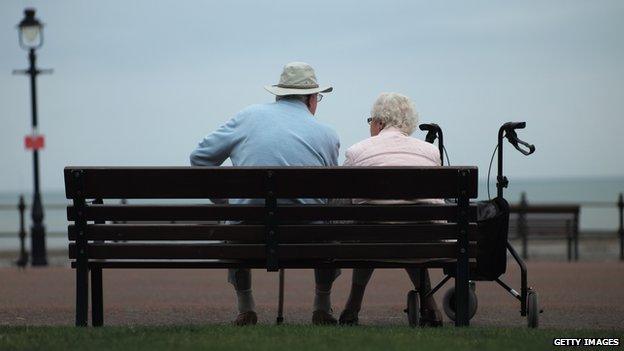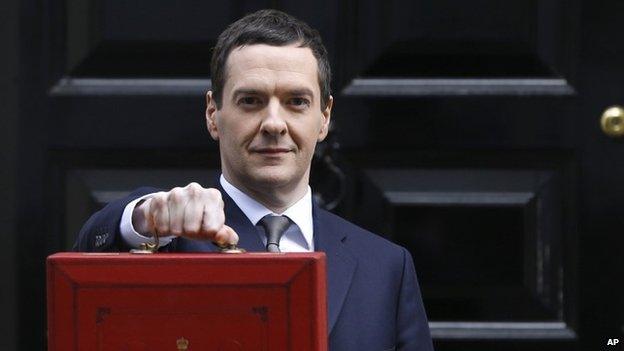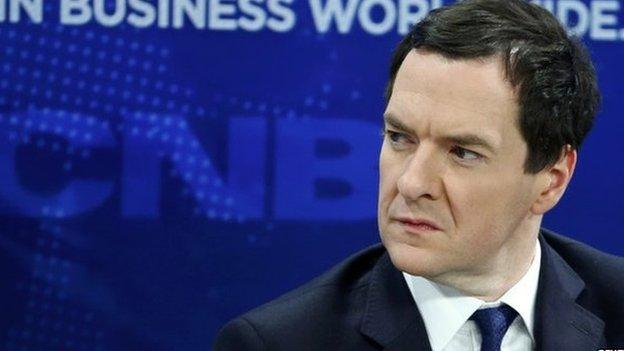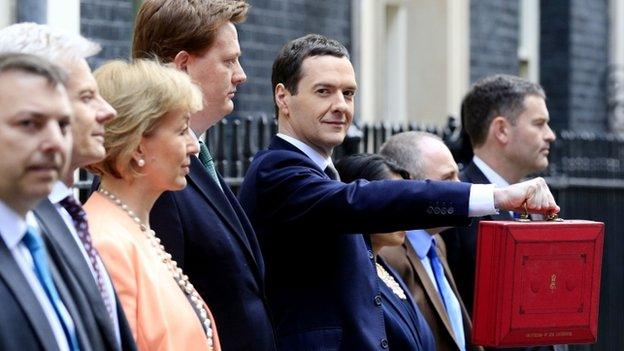Welfare spending to fall to 25-year low, warns IFS
- Published

Social security spending has seen no real reduction as pensions and the number of pensioners continue to rise
Government spending cuts will see unprotected parts of the social security budget fall to their lowest level for 25 years, the Institute for Fiscal Studies (IFS) has warned.
The IFS said protecting pensioner benefits meant cuts of almost 10% over two years to the welfare budget.
That would take welfare spending as a share of GDP to its lowest since 1990.
The government has committed to taking £12bn out of social security spending by 2018.
Welfare spending currently amounts to £220bn annually. That includes £95bn on the state pension and universal pensioner benefits, such as the winter fuel allowance, free bus travel and television licences for the over-75s.
The Conservatives have promised those areas of welfare spending will remain protected throughout the life of the current parliament.
But the remaining £125bn of welfare spending could be subject to freezes or cuts.
Unprotected welfare benefits include child benefit, housing and disability benefits and jobseekers' allowance.
Analysing what cuts the government might make, Carl Emmerson, deputy director of the IFS, said plans already announced to freeze working age benefits for two years would save £1bn annually.
He added the government's planned reduction to the household benefit cap, from £26,000 annually now to £23,000, would save £100m a year.
Meanwhile, the planned removal of housing benefit from 18 to 21 year olds who are claiming jobseekers' allowance would also only save £100m annually.
That amounted to just one-10th of the cuts the government needed to make to welfare spending in order to meet its goal, the IFS said, leaving £10bn of cuts still to be made.

Chancellor George Osborne will deliver the first Conservative Budget for 18 years in July
The think tank's assessment of potential government spending cuts come after Prime Minister David Cameron said spending would fall by around £1 for every £100 of departmental spending.
Mr Emmerson said this "seriously underestimates the size of the challenge we face".
He added: "The cuts that the government announces later this year in next month's Budget and the following spending review may turn out to be deliverable.
"But they certainly will not feel like it is just 1% being taken out of each area of spending, nor will it require merely '£13bn from departmental savings' as the Conservative manifesto described.
"While not inaccurate, these numbers give a misleading impression of what departmental spending in many areas will look like if the manifesto commitment to eliminate the deficit by 2018-19, largely through spending cuts, while not cutting spending in many areas, is to be met."
The level of cuts would also be much deeper than under the coalition government, the IFS warned.

Analysis: Robert Peston, BBC economics editor
The big economic and political question for the prime minister and chancellor is whether to get the pain of slashing the deficit out of the way as early as possible in the Parliament, and risk significant strife and protest, or adopt a smoother path to putting the public finances on a more sustainable footing.
The politics of all this point in contradictory directions.
On the one hand, the Tories - against almost everyone's expectations, including the prime minister's - won a clear overall majority. And there was never any ambiguity during the general election campaign that the Conservatives would cut harder and faster than the other parties.
On the other, the eccentricities of the British electoral system mean that the Tories' overall majority was won with three-quarters of eligible voters not actually voting for them - and their lead in the Commons is slim.
So to tell you what you already know, making further cuts, without being perceived to be harming the innocent and vulnerable, will be a challenge.

It said the coalition achieved £15bn of cuts to the welfare budget over the five years between 2010 and 2015, amounting to £3bn a year on average.
The aim to cut £12bn over the next two years meant the cuts to welfare spending would be more than double those achieved by the coalition on an annual basis.
The IFS identified three areas of the welfare budget where the axe might fall.
It said one way of making cuts would be to reduce the "child element" of child tax credit by 30%, which would save £5bn per year. But doing so would put 300,000 children below the poverty line, it added.
Another possible cut could involve a 10% reduction in housing benefits payments leaving those in receipt of the benefits to make up the shortfall themselves. The IFS estimated this would save the government £2.5bn a year.
Another option, taxing disability and incapacity benefits, could save the government £1.5bn a year, the IFS added.
In order for the government to keep its manifesto pledge to achieve a surplus by 2018 to 2019, average government departmental spending would also have to fall.
The IFS said spending was likely to be 6.6% lower in 2018 compared to now, marking a slight increase to 2.2% a year from the average of 2% a year in cuts to spending achieved in the last parliament.
That meant a real terms cut in government spending of £23.8bn a year by 2018 compared with this year, it added.
But the IFS warned that government departmental spending cuts would not be evenly spread due to the Conservative party's commitment to protect, or even increase, areas of spending including the National Health Service (NHS), education and international aid.
The government has already promised to increase NHS funding by £8bn a year by 2020.
As a result, unprotected government departmental spending would, on average, be 15.6%, or £62.8bn lower in real terms in 2018 to 2019 than in 2010 and 2011.
Another area of concern was the squeeze on public sector pay.
The IFS warned that were public sector pay to rise in line with Office for Budget Responsibility (OBR) forecasts in March, there were likely to be a further 500,000 job cuts by 2018 and 2019, which would take the number of public sector staff to its lowest level since 1974.
The IFS forecast follows a warning from the Organisation for Economic Co-operation and Development (OECD), in its annual report to the chancellor, to make the pace of spending cuts "more gradual by extending it beyond 2018" in order to "lower its impact on growth".
It also follows an announcement from Mr Osborne of a further £3bn of departmental savings in this tax year, as well as the sale of the government's remaining take in the Royal Mail, which the Treasury believes will raise around £1.5bn.
- Published4 February 2015

- Published19 March 2015

- Published4 June 2015
